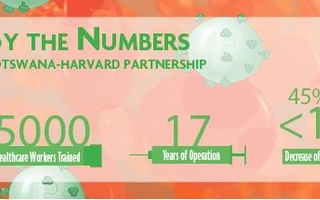The Centers for Disease Control and Prevention have awarded a four-year $20 million grant to researchers at the School of Public Health to study HIV prevention in Botswana as part of a President’s Emergency Plan for AIDS Relief (PEPFAR) initiative.
The Harvard researchers will investigate whether the combination of treating HIV-positive patients early and providing voluntary male circumcision and care for pregnant women with HIV can successfully control the epidemic, according to co-principal investigator Victor De Gruttola, an HSPH biostatistics professor.
Rather than randomly selecting individuals to participate in the study, the researchers will randomly select 16 different villages in Botswana to examine the community-level effects of intervention.
“You know the individual parts of a car may work well, but you don’t know if it will still work when you put all the parts together,” Gruttola said. “And that’s what we need to learn.”
The researchers will also attempt to increase the rate at which people are tested for and informed of their HIV status, Gruttola said.
Meanwhile, a subset of the study will focus on viral genetic sequencing to determine the transmission chains of the virus.
“We are trying to find out where the holes are so we can plug them,” Gruttola said. “And one of the challenges will be, as we learn throughout the course of the study, [finding out] what works and what doesn’t.”
The current outline of the study is based on the proposal submitted to the CDC as part of the application. The researchers will work jointly with the CDC to develop a final plan.
Researchers and the CDC will meet to create a definitive course of action on Sept. 30 in Atlanta.
The researchers have already completed a prototype of the study in the village of Mochudi in Botswana with funding from the National Institutes of Health.
The Harvard team will be collaborating with the Botswana-Harvard Partnership, a division of the HSPH AIDS Initiative led by HSPH Professor Max Essex, the lead principal investigator for the study.
In addition to supporting the HSPH study, PEPFAR pledged a total of $25 million to the London School of Hygiene and Tropical Medicine and Johns Hopkins University in an effort to examine the efficacy of combination strategies in preventing HIV, according to the PEPFAR website.
“It’s really a wonderful thing that the United States has committed the resources, particularly in difficult times, to identify the best way of controlling HIV in sub-Saharan Africa,” Gruttola said.
—Staff writer Melanie A. Guzman can be reached at melanieguzman@college.harvard.edu.
Read more in News
Crimson OLB Deal Sidelined With Knee InjuryRecommended Articles
-
Drew Goes on SafariThis November, President Drew G. Faust will be traveling to South Africa and Botswana. To help our girl out, FM ...
-
HSPH Professor Dies in Car CrashStephen W. Lagakos, a long-time Harvard biostatistics professor whom colleagues remembered for his scientific leadership and personal warmth, died in ...
-
Centers in Africa Fight HIV/AIDSEarlier this year, Harvard’s two HIV/AIDS research centers in Africa each spun off limited liability companies, a strategic move that will open up funding streams that had previously been off-limits due to federal restrictions. For the 120,000 AIDS orphans living in Botswana, the potential funding increase could speed further advances in research as well as public health initiatives.
-
HSPH Professor’s Death ProbedFederal inspectors are investigating whether the death of Professor Stephen W. Lagakos last October in a car crash was caused by sudden-acceleration problems attributed to defective Toyota cars.
-
Biostatistics Professor Stephen W. Lagakos Honored at HSPH EventMore than a year after his death in a car accident, Biostatistics Professor Stephen W. Lagakos was honored at an all-day memorial symposium last Friday.
-
 Harvard Partnership Fights HIV/AIDS in Botswana
Harvard Partnership Fights HIV/AIDS in Botswana













